Family Law: Financial Provision, Divorce, and Case Laws in the UK
VerifiedAdded on 2023/04/21
|12
|3844
|432
Report
AI Summary
This report provides a comprehensive overview of UK family law concerning financial provision in divorce cases. It begins by outlining the relevant legislation, including the Matrimonial Property Act, and explains the general principles governing property division. The report details the grounds for divorce under UK law, emphasizing factors that influence financial settlements. It then explores how financial resources and property are allocated during marriage breakdown, covering properties included and excluded from division, valuation methods, and the court's considerations. Furthermore, the report analyzes several key case laws, such as Atkinson v Atkinson, Landers v. Landers, AP v TD, Duxbury v Duxbury, and D v D, to illustrate how these principles are applied in practice. The report provides a clear understanding of how courts determine financial settlements in divorce proceedings, considering various factors and legal precedents.
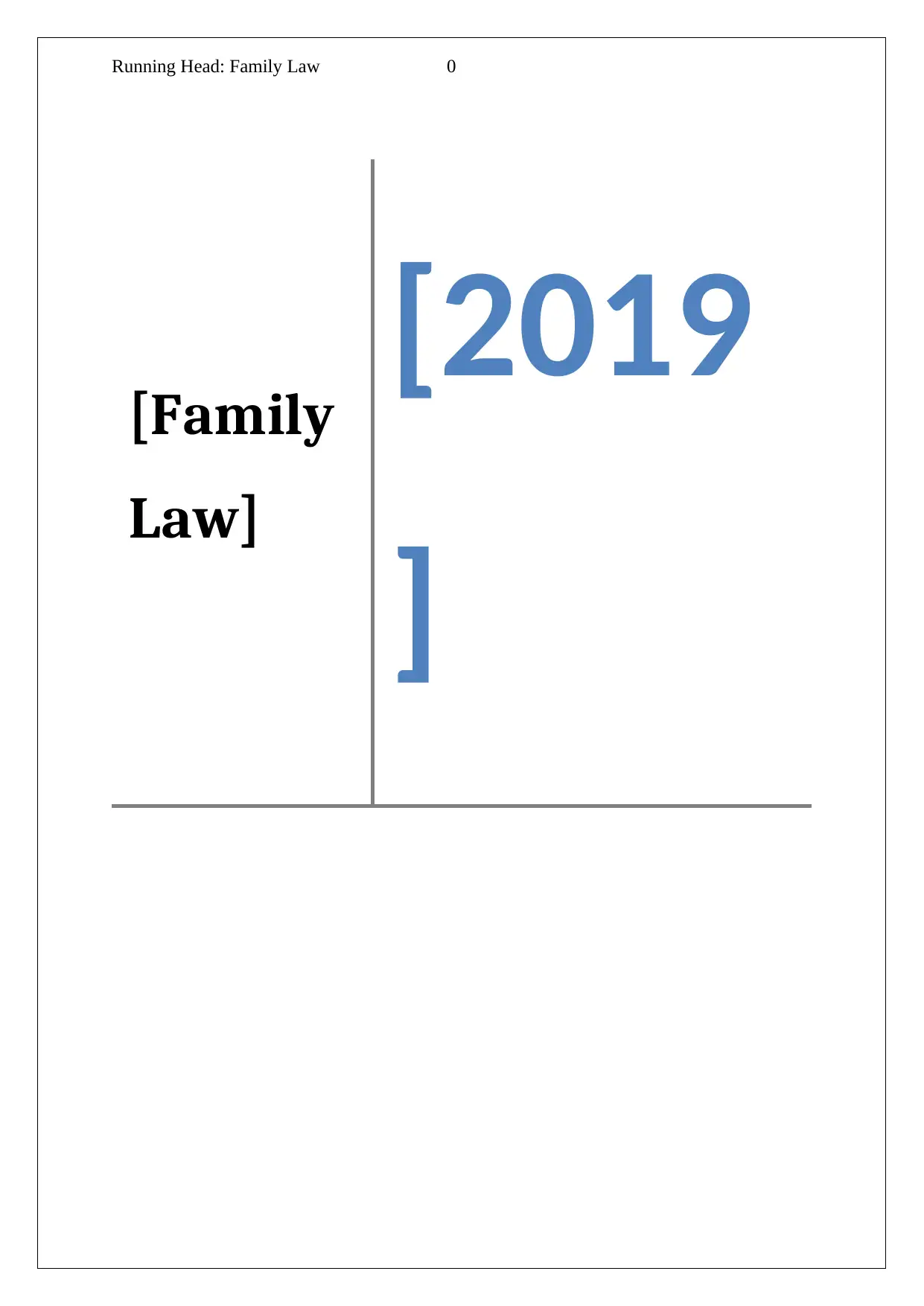
Running Head: Family Law 0
[Family
Law]
[2019
]
[Family
Law]
[2019
]
Paraphrase This Document
Need a fresh take? Get an instant paraphrase of this document with our AI Paraphraser
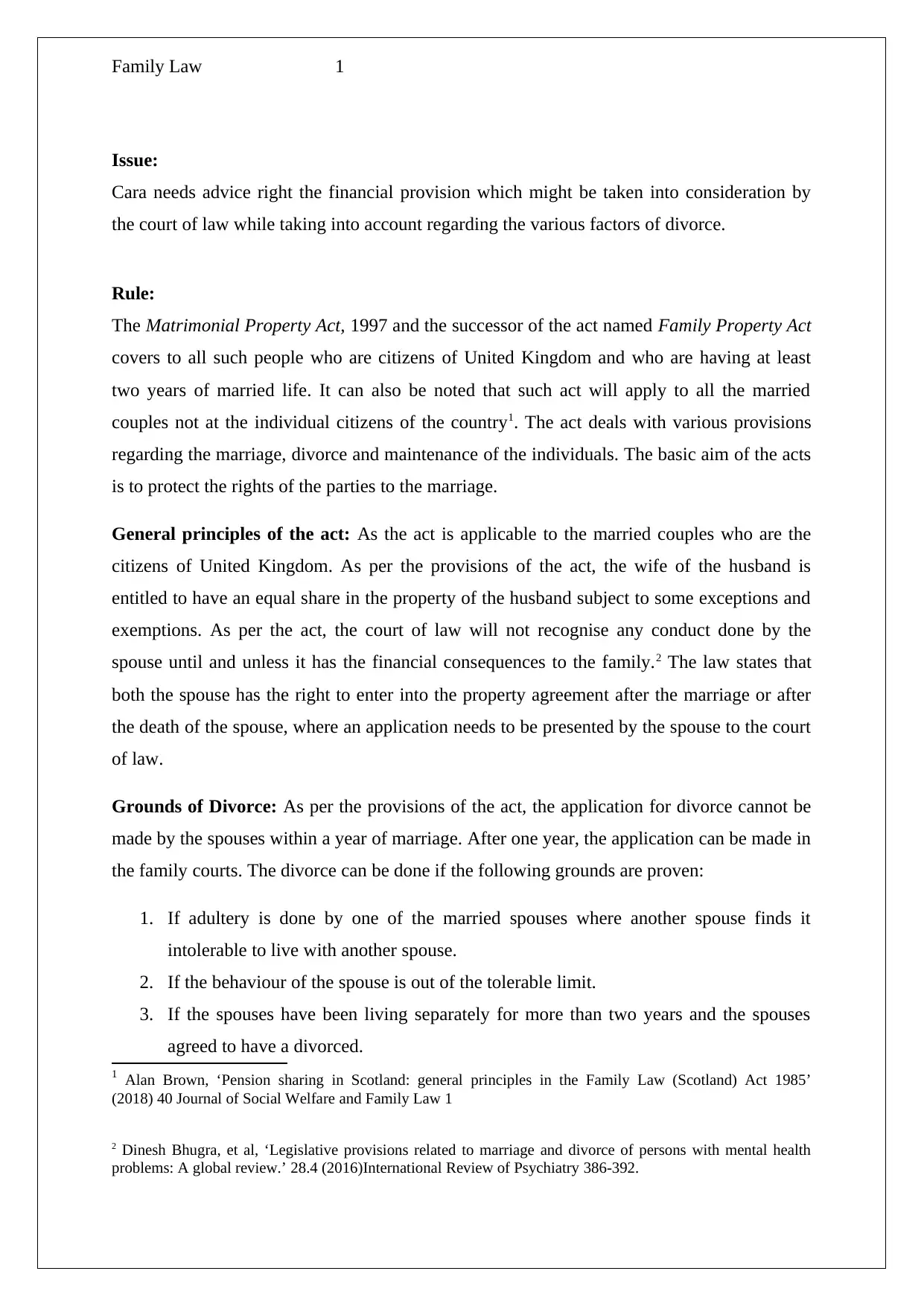
Family Law 1
Issue:
Cara needs advice right the financial provision which might be taken into consideration by
the court of law while taking into account regarding the various factors of divorce.
Rule:
The Matrimonial Property Act, 1997 and the successor of the act named Family Property Act
covers to all such people who are citizens of United Kingdom and who are having at least
two years of married life. It can also be noted that such act will apply to all the married
couples not at the individual citizens of the country1. The act deals with various provisions
regarding the marriage, divorce and maintenance of the individuals. The basic aim of the acts
is to protect the rights of the parties to the marriage.
General principles of the act: As the act is applicable to the married couples who are the
citizens of United Kingdom. As per the provisions of the act, the wife of the husband is
entitled to have an equal share in the property of the husband subject to some exceptions and
exemptions. As per the act, the court of law will not recognise any conduct done by the
spouse until and unless it has the financial consequences to the family.2 The law states that
both the spouse has the right to enter into the property agreement after the marriage or after
the death of the spouse, where an application needs to be presented by the spouse to the court
of law.
Grounds of Divorce: As per the provisions of the act, the application for divorce cannot be
made by the spouses within a year of marriage. After one year, the application can be made in
the family courts. The divorce can be done if the following grounds are proven:
1. If adultery is done by one of the married spouses where another spouse finds it
intolerable to live with another spouse.
2. If the behaviour of the spouse is out of the tolerable limit.
3. If the spouses have been living separately for more than two years and the spouses
agreed to have a divorced.
1 Alan Brown, ‘Pension sharing in Scotland: general principles in the Family Law (Scotland) Act 1985’
(2018) 40 Journal of Social Welfare and Family Law 1
2 Dinesh Bhugra, et al, ‘Legislative provisions related to marriage and divorce of persons with mental health
problems: A global review.’ 28.4 (2016)International Review of Psychiatry 386-392.
Issue:
Cara needs advice right the financial provision which might be taken into consideration by
the court of law while taking into account regarding the various factors of divorce.
Rule:
The Matrimonial Property Act, 1997 and the successor of the act named Family Property Act
covers to all such people who are citizens of United Kingdom and who are having at least
two years of married life. It can also be noted that such act will apply to all the married
couples not at the individual citizens of the country1. The act deals with various provisions
regarding the marriage, divorce and maintenance of the individuals. The basic aim of the acts
is to protect the rights of the parties to the marriage.
General principles of the act: As the act is applicable to the married couples who are the
citizens of United Kingdom. As per the provisions of the act, the wife of the husband is
entitled to have an equal share in the property of the husband subject to some exceptions and
exemptions. As per the act, the court of law will not recognise any conduct done by the
spouse until and unless it has the financial consequences to the family.2 The law states that
both the spouse has the right to enter into the property agreement after the marriage or after
the death of the spouse, where an application needs to be presented by the spouse to the court
of law.
Grounds of Divorce: As per the provisions of the act, the application for divorce cannot be
made by the spouses within a year of marriage. After one year, the application can be made in
the family courts. The divorce can be done if the following grounds are proven:
1. If adultery is done by one of the married spouses where another spouse finds it
intolerable to live with another spouse.
2. If the behaviour of the spouse is out of the tolerable limit.
3. If the spouses have been living separately for more than two years and the spouses
agreed to have a divorced.
1 Alan Brown, ‘Pension sharing in Scotland: general principles in the Family Law (Scotland) Act 1985’
(2018) 40 Journal of Social Welfare and Family Law 1
2 Dinesh Bhugra, et al, ‘Legislative provisions related to marriage and divorce of persons with mental health
problems: A global review.’ 28.4 (2016)International Review of Psychiatry 386-392.
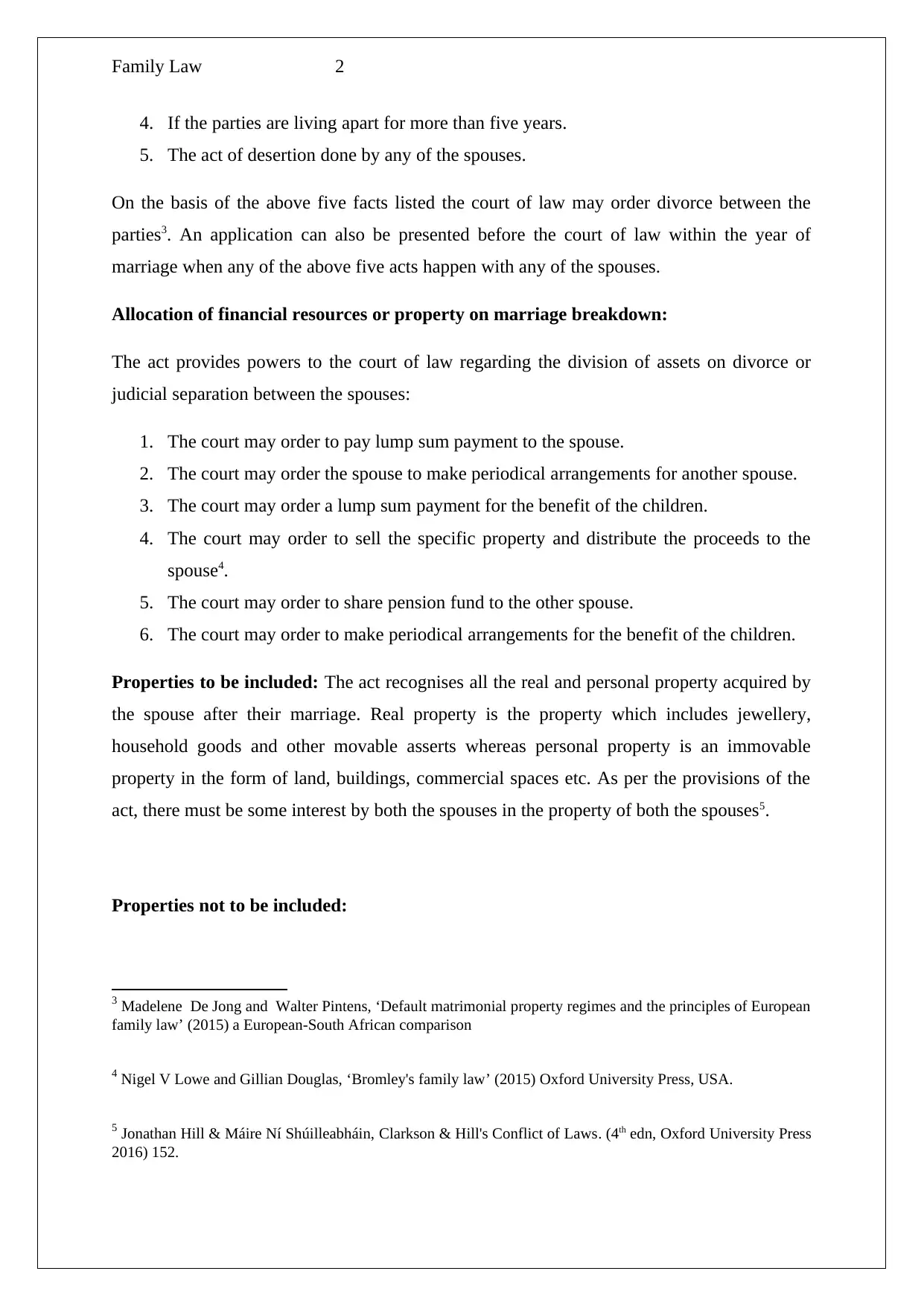
Family Law 2
4. If the parties are living apart for more than five years.
5. The act of desertion done by any of the spouses.
On the basis of the above five facts listed the court of law may order divorce between the
parties3. An application can also be presented before the court of law within the year of
marriage when any of the above five acts happen with any of the spouses.
Allocation of financial resources or property on marriage breakdown:
The act provides powers to the court of law regarding the division of assets on divorce or
judicial separation between the spouses:
1. The court may order to pay lump sum payment to the spouse.
2. The court may order the spouse to make periodical arrangements for another spouse.
3. The court may order a lump sum payment for the benefit of the children.
4. The court may order to sell the specific property and distribute the proceeds to the
spouse4.
5. The court may order to share pension fund to the other spouse.
6. The court may order to make periodical arrangements for the benefit of the children.
Properties to be included: The act recognises all the real and personal property acquired by
the spouse after their marriage. Real property is the property which includes jewellery,
household goods and other movable asserts whereas personal property is an immovable
property in the form of land, buildings, commercial spaces etc. As per the provisions of the
act, there must be some interest by both the spouses in the property of both the spouses5.
Properties not to be included:
3 Madelene De Jong and Walter Pintens, ‘Default matrimonial property regimes and the principles of European
family law’ (2015) a European-South African comparison
4 Nigel V Lowe and Gillian Douglas, ‘Bromley's family law’ (2015) Oxford University Press, USA.
5 Jonathan Hill & Máire Ní Shúilleabháin, Clarkson & Hill's Conflict of Laws. (4th edn, Oxford University Press
2016) 152.
4. If the parties are living apart for more than five years.
5. The act of desertion done by any of the spouses.
On the basis of the above five facts listed the court of law may order divorce between the
parties3. An application can also be presented before the court of law within the year of
marriage when any of the above five acts happen with any of the spouses.
Allocation of financial resources or property on marriage breakdown:
The act provides powers to the court of law regarding the division of assets on divorce or
judicial separation between the spouses:
1. The court may order to pay lump sum payment to the spouse.
2. The court may order the spouse to make periodical arrangements for another spouse.
3. The court may order a lump sum payment for the benefit of the children.
4. The court may order to sell the specific property and distribute the proceeds to the
spouse4.
5. The court may order to share pension fund to the other spouse.
6. The court may order to make periodical arrangements for the benefit of the children.
Properties to be included: The act recognises all the real and personal property acquired by
the spouse after their marriage. Real property is the property which includes jewellery,
household goods and other movable asserts whereas personal property is an immovable
property in the form of land, buildings, commercial spaces etc. As per the provisions of the
act, there must be some interest by both the spouses in the property of both the spouses5.
Properties not to be included:
3 Madelene De Jong and Walter Pintens, ‘Default matrimonial property regimes and the principles of European
family law’ (2015) a European-South African comparison
4 Nigel V Lowe and Gillian Douglas, ‘Bromley's family law’ (2015) Oxford University Press, USA.
5 Jonathan Hill & Máire Ní Shúilleabháin, Clarkson & Hill's Conflict of Laws. (4th edn, Oxford University Press
2016) 152.
⊘ This is a preview!⊘
Do you want full access?
Subscribe today to unlock all pages.

Trusted by 1+ million students worldwide
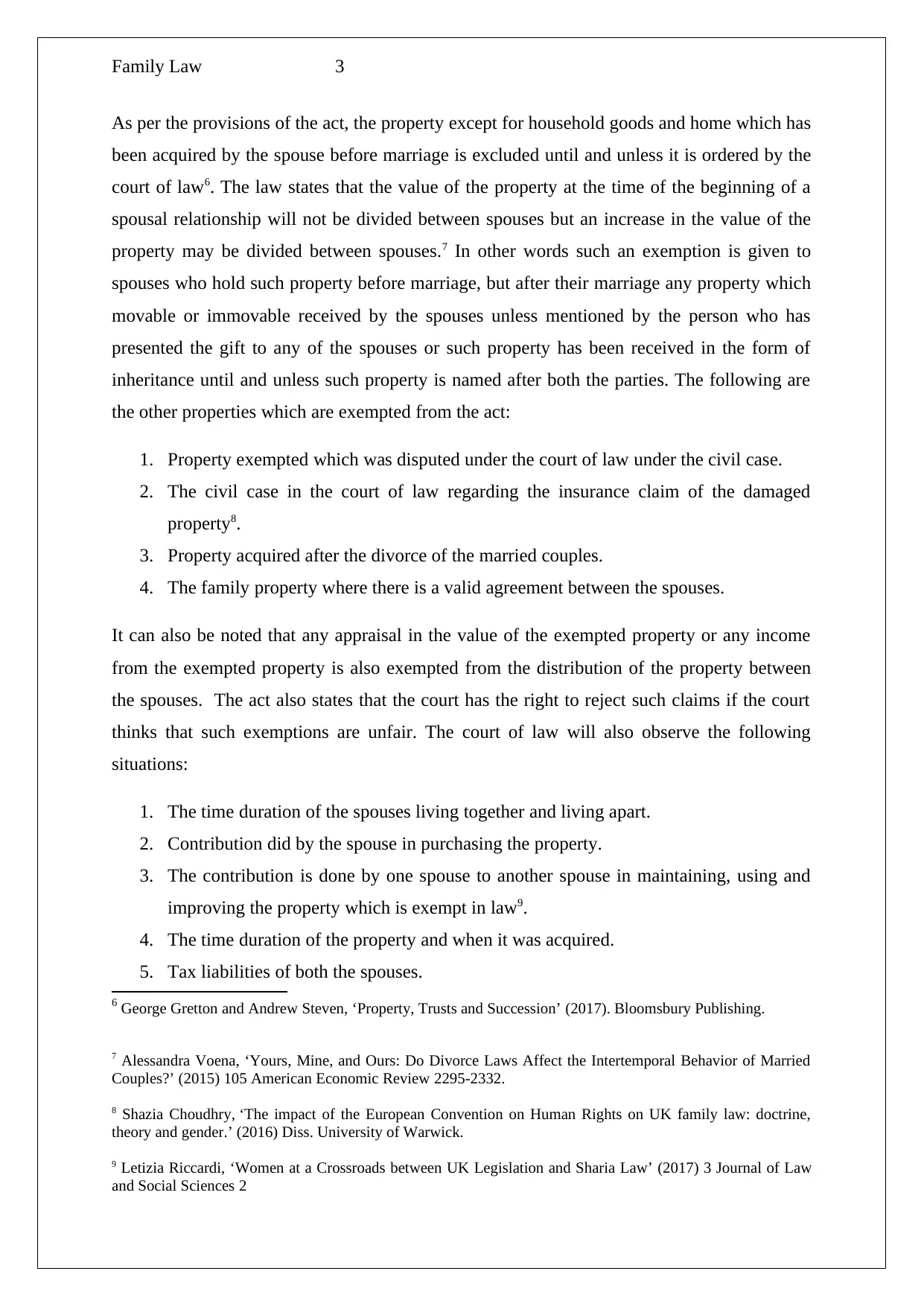
Family Law 3
As per the provisions of the act, the property except for household goods and home which has
been acquired by the spouse before marriage is excluded until and unless it is ordered by the
court of law6. The law states that the value of the property at the time of the beginning of a
spousal relationship will not be divided between spouses but an increase in the value of the
property may be divided between spouses.7 In other words such an exemption is given to
spouses who hold such property before marriage, but after their marriage any property which
movable or immovable received by the spouses unless mentioned by the person who has
presented the gift to any of the spouses or such property has been received in the form of
inheritance until and unless such property is named after both the parties. The following are
the other properties which are exempted from the act:
1. Property exempted which was disputed under the court of law under the civil case.
2. The civil case in the court of law regarding the insurance claim of the damaged
property8.
3. Property acquired after the divorce of the married couples.
4. The family property where there is a valid agreement between the spouses.
It can also be noted that any appraisal in the value of the exempted property or any income
from the exempted property is also exempted from the distribution of the property between
the spouses. The act also states that the court has the right to reject such claims if the court
thinks that such exemptions are unfair. The court of law will also observe the following
situations:
1. The time duration of the spouses living together and living apart.
2. Contribution did by the spouse in purchasing the property.
3. The contribution is done by one spouse to another spouse in maintaining, using and
improving the property which is exempt in law9.
4. The time duration of the property and when it was acquired.
5. Tax liabilities of both the spouses.
6 George Gretton and Andrew Steven, ‘Property, Trusts and Succession’ (2017). Bloomsbury Publishing.
7 Alessandra Voena, ‘Yours, Mine, and Ours: Do Divorce Laws Affect the Intertemporal Behavior of Married
Couples?’ (2015) 105 American Economic Review 2295-2332.
8 Shazia Choudhry, ‘The impact of the European Convention on Human Rights on UK family law: doctrine,
theory and gender.’ (2016) Diss. University of Warwick.
9 Letizia Riccardi, ‘Women at a Crossroads between UK Legislation and Sharia Law’ (2017) 3 Journal of Law
and Social Sciences 2
As per the provisions of the act, the property except for household goods and home which has
been acquired by the spouse before marriage is excluded until and unless it is ordered by the
court of law6. The law states that the value of the property at the time of the beginning of a
spousal relationship will not be divided between spouses but an increase in the value of the
property may be divided between spouses.7 In other words such an exemption is given to
spouses who hold such property before marriage, but after their marriage any property which
movable or immovable received by the spouses unless mentioned by the person who has
presented the gift to any of the spouses or such property has been received in the form of
inheritance until and unless such property is named after both the parties. The following are
the other properties which are exempted from the act:
1. Property exempted which was disputed under the court of law under the civil case.
2. The civil case in the court of law regarding the insurance claim of the damaged
property8.
3. Property acquired after the divorce of the married couples.
4. The family property where there is a valid agreement between the spouses.
It can also be noted that any appraisal in the value of the exempted property or any income
from the exempted property is also exempted from the distribution of the property between
the spouses. The act also states that the court has the right to reject such claims if the court
thinks that such exemptions are unfair. The court of law will also observe the following
situations:
1. The time duration of the spouses living together and living apart.
2. Contribution did by the spouse in purchasing the property.
3. The contribution is done by one spouse to another spouse in maintaining, using and
improving the property which is exempt in law9.
4. The time duration of the property and when it was acquired.
5. Tax liabilities of both the spouses.
6 George Gretton and Andrew Steven, ‘Property, Trusts and Succession’ (2017). Bloomsbury Publishing.
7 Alessandra Voena, ‘Yours, Mine, and Ours: Do Divorce Laws Affect the Intertemporal Behavior of Married
Couples?’ (2015) 105 American Economic Review 2295-2332.
8 Shazia Choudhry, ‘The impact of the European Convention on Human Rights on UK family law: doctrine,
theory and gender.’ (2016) Diss. University of Warwick.
9 Letizia Riccardi, ‘Women at a Crossroads between UK Legislation and Sharia Law’ (2017) 3 Journal of Law
and Social Sciences 2
Paraphrase This Document
Need a fresh take? Get an instant paraphrase of this document with our AI Paraphraser
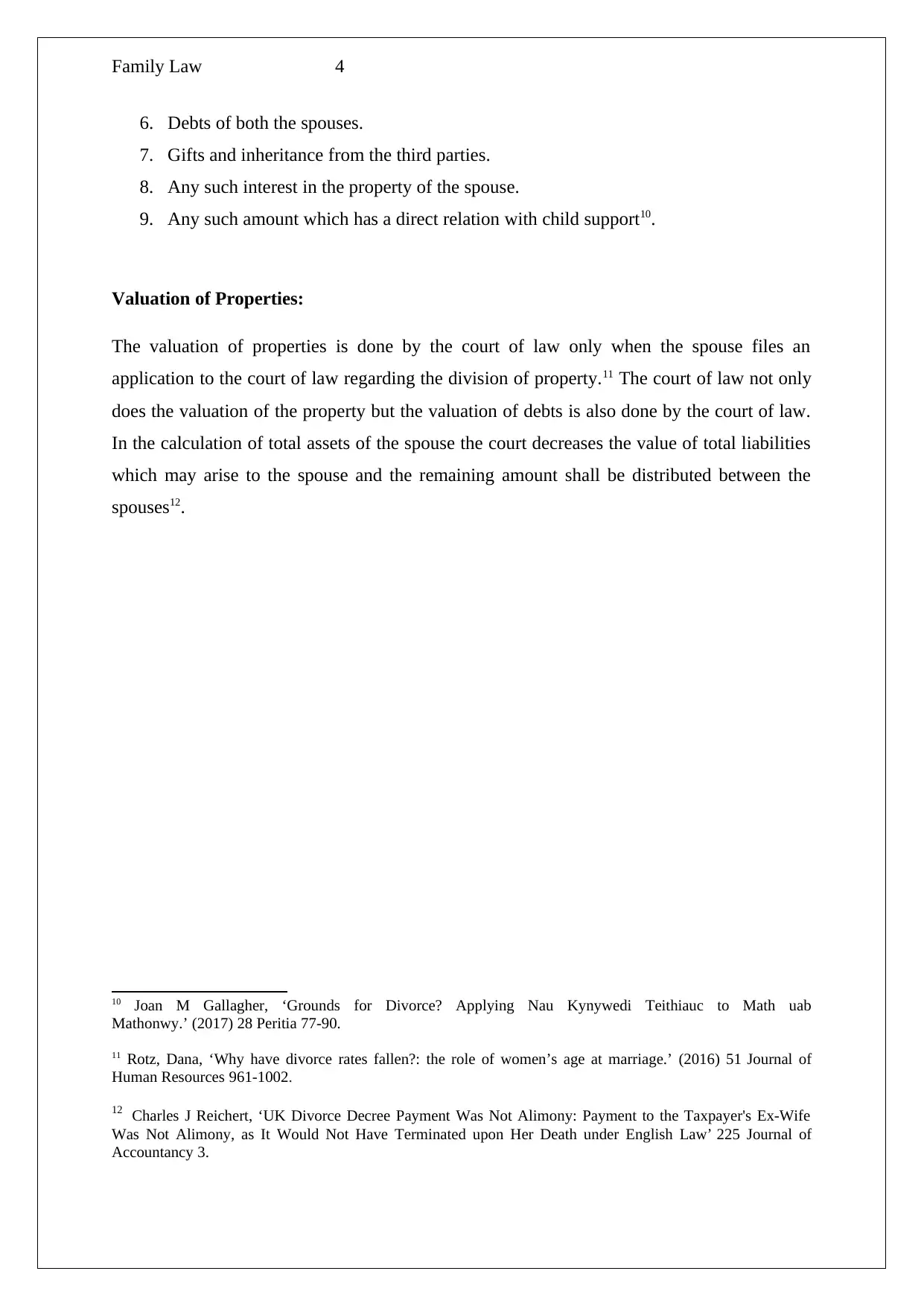
Family Law 4
6. Debts of both the spouses.
7. Gifts and inheritance from the third parties.
8. Any such interest in the property of the spouse.
9. Any such amount which has a direct relation with child support10.
Valuation of Properties:
The valuation of properties is done by the court of law only when the spouse files an
application to the court of law regarding the division of property.11 The court of law not only
does the valuation of the property but the valuation of debts is also done by the court of law.
In the calculation of total assets of the spouse the court decreases the value of total liabilities
which may arise to the spouse and the remaining amount shall be distributed between the
spouses12.
10 Joan M Gallagher, ‘Grounds for Divorce? Applying Nau Kynywedi Teithiauc to Math uab
Mathonwy.’ (2017) 28 Peritia 77-90.
11 Rotz, Dana, ‘Why have divorce rates fallen?: the role of women’s age at marriage.’ (2016) 51 Journal of
Human Resources 961-1002.
12 Charles J Reichert, ‘UK Divorce Decree Payment Was Not Alimony: Payment to the Taxpayer's Ex-Wife
Was Not Alimony, as It Would Not Have Terminated upon Her Death under English Law’ 225 Journal of
Accountancy 3.
6. Debts of both the spouses.
7. Gifts and inheritance from the third parties.
8. Any such interest in the property of the spouse.
9. Any such amount which has a direct relation with child support10.
Valuation of Properties:
The valuation of properties is done by the court of law only when the spouse files an
application to the court of law regarding the division of property.11 The court of law not only
does the valuation of the property but the valuation of debts is also done by the court of law.
In the calculation of total assets of the spouse the court decreases the value of total liabilities
which may arise to the spouse and the remaining amount shall be distributed between the
spouses12.
10 Joan M Gallagher, ‘Grounds for Divorce? Applying Nau Kynywedi Teithiauc to Math uab
Mathonwy.’ (2017) 28 Peritia 77-90.
11 Rotz, Dana, ‘Why have divorce rates fallen?: the role of women’s age at marriage.’ (2016) 51 Journal of
Human Resources 961-1002.
12 Charles J Reichert, ‘UK Divorce Decree Payment Was Not Alimony: Payment to the Taxpayer's Ex-Wife
Was Not Alimony, as It Would Not Have Terminated upon Her Death under English Law’ 225 Journal of
Accountancy 3.
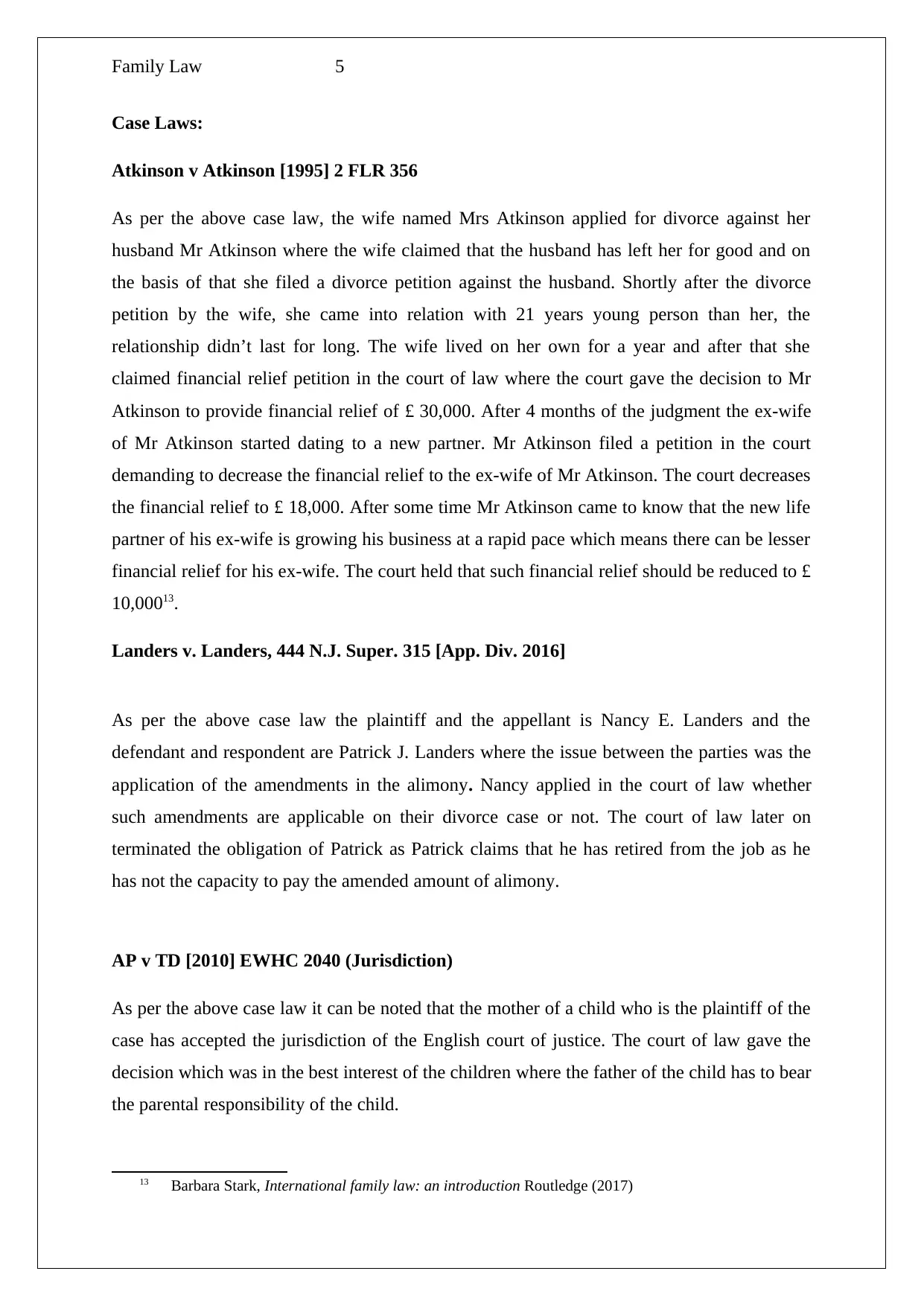
Family Law 5
Case Laws:
Atkinson v Atkinson [1995] 2 FLR 356
As per the above case law, the wife named Mrs Atkinson applied for divorce against her
husband Mr Atkinson where the wife claimed that the husband has left her for good and on
the basis of that she filed a divorce petition against the husband. Shortly after the divorce
petition by the wife, she came into relation with 21 years young person than her, the
relationship didn’t last for long. The wife lived on her own for a year and after that she
claimed financial relief petition in the court of law where the court gave the decision to Mr
Atkinson to provide financial relief of £ 30,000. After 4 months of the judgment the ex-wife
of Mr Atkinson started dating to a new partner. Mr Atkinson filed a petition in the court
demanding to decrease the financial relief to the ex-wife of Mr Atkinson. The court decreases
the financial relief to £ 18,000. After some time Mr Atkinson came to know that the new life
partner of his ex-wife is growing his business at a rapid pace which means there can be lesser
financial relief for his ex-wife. The court held that such financial relief should be reduced to £
10,00013.
Landers v. Landers, 444 N.J. Super. 315 [App. Div. 2016]
As per the above case law the plaintiff and the appellant is Nancy E. Landers and the
defendant and respondent are Patrick J. Landers where the issue between the parties was the
application of the amendments in the alimony. Nancy applied in the court of law whether
such amendments are applicable on their divorce case or not. The court of law later on
terminated the obligation of Patrick as Patrick claims that he has retired from the job as he
has not the capacity to pay the amended amount of alimony.
AP v TD [2010] EWHC 2040 (Jurisdiction)
As per the above case law it can be noted that the mother of a child who is the plaintiff of the
case has accepted the jurisdiction of the English court of justice. The court of law gave the
decision which was in the best interest of the children where the father of the child has to bear
the parental responsibility of the child.
13 Barbara Stark, International family law: an introduction Routledge (2017)
Case Laws:
Atkinson v Atkinson [1995] 2 FLR 356
As per the above case law, the wife named Mrs Atkinson applied for divorce against her
husband Mr Atkinson where the wife claimed that the husband has left her for good and on
the basis of that she filed a divorce petition against the husband. Shortly after the divorce
petition by the wife, she came into relation with 21 years young person than her, the
relationship didn’t last for long. The wife lived on her own for a year and after that she
claimed financial relief petition in the court of law where the court gave the decision to Mr
Atkinson to provide financial relief of £ 30,000. After 4 months of the judgment the ex-wife
of Mr Atkinson started dating to a new partner. Mr Atkinson filed a petition in the court
demanding to decrease the financial relief to the ex-wife of Mr Atkinson. The court decreases
the financial relief to £ 18,000. After some time Mr Atkinson came to know that the new life
partner of his ex-wife is growing his business at a rapid pace which means there can be lesser
financial relief for his ex-wife. The court held that such financial relief should be reduced to £
10,00013.
Landers v. Landers, 444 N.J. Super. 315 [App. Div. 2016]
As per the above case law the plaintiff and the appellant is Nancy E. Landers and the
defendant and respondent are Patrick J. Landers where the issue between the parties was the
application of the amendments in the alimony. Nancy applied in the court of law whether
such amendments are applicable on their divorce case or not. The court of law later on
terminated the obligation of Patrick as Patrick claims that he has retired from the job as he
has not the capacity to pay the amended amount of alimony.
AP v TD [2010] EWHC 2040 (Jurisdiction)
As per the above case law it can be noted that the mother of a child who is the plaintiff of the
case has accepted the jurisdiction of the English court of justice. The court of law gave the
decision which was in the best interest of the children where the father of the child has to bear
the parental responsibility of the child.
13 Barbara Stark, International family law: an introduction Routledge (2017)
⊘ This is a preview!⊘
Do you want full access?
Subscribe today to unlock all pages.

Trusted by 1+ million students worldwide
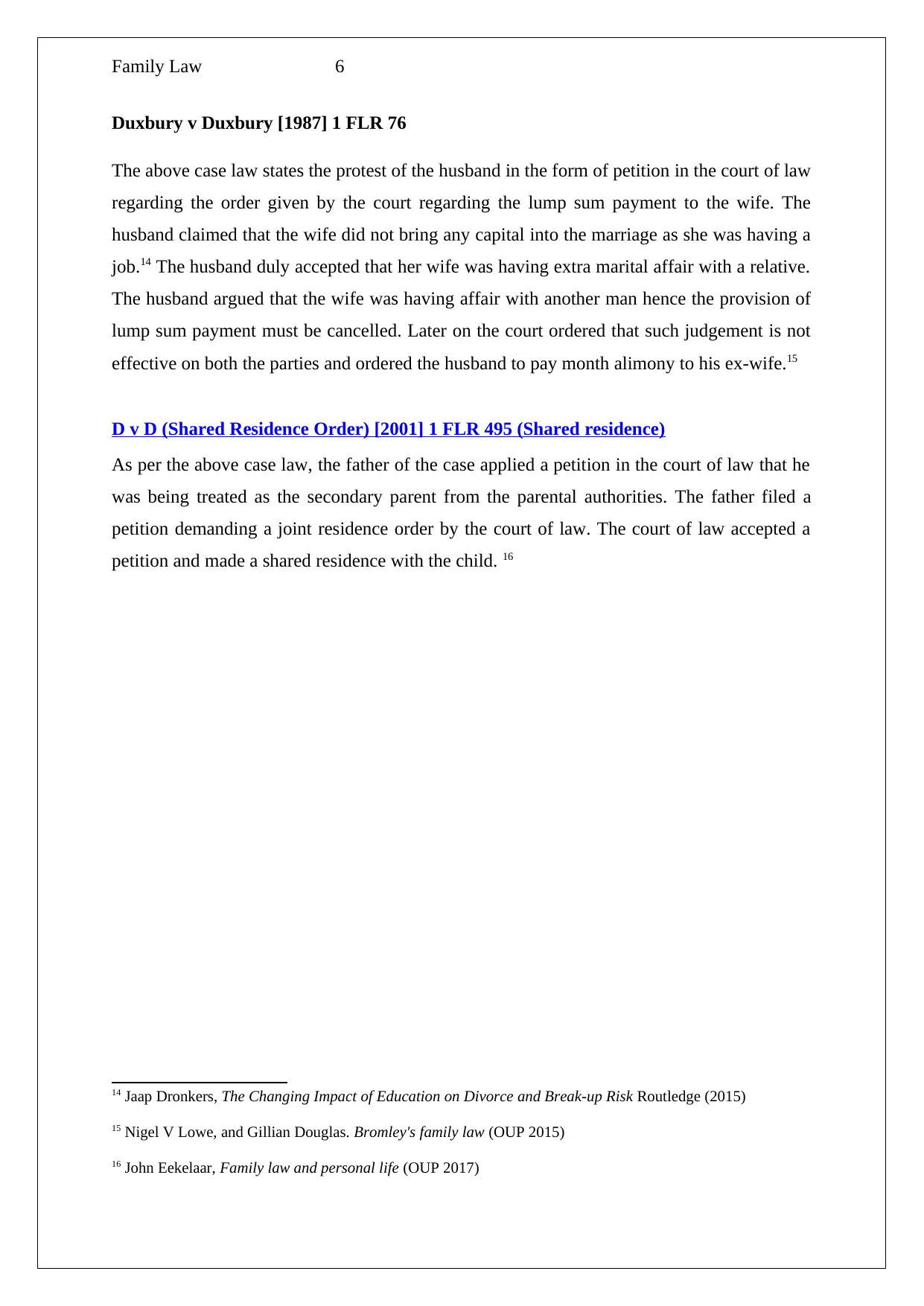
Family Law 6
Duxbury v Duxbury [1987] 1 FLR 76
The above case law states the protest of the husband in the form of petition in the court of law
regarding the order given by the court regarding the lump sum payment to the wife. The
husband claimed that the wife did not bring any capital into the marriage as she was having a
job.14 The husband duly accepted that her wife was having extra marital affair with a relative.
The husband argued that the wife was having affair with another man hence the provision of
lump sum payment must be cancelled. Later on the court ordered that such judgement is not
effective on both the parties and ordered the husband to pay month alimony to his ex-wife.15
D v D (Shared Residence Order) [2001] 1 FLR 495 (Shared residence)
As per the above case law, the father of the case applied a petition in the court of law that he
was being treated as the secondary parent from the parental authorities. The father filed a
petition demanding a joint residence order by the court of law. The court of law accepted a
petition and made a shared residence with the child. 16
14 Jaap Dronkers, The Changing Impact of Education on Divorce and Break-up Risk Routledge (2015)
15 Nigel V Lowe, and Gillian Douglas. Bromley's family law (OUP 2015)
16 John Eekelaar, Family law and personal life (OUP 2017)
Duxbury v Duxbury [1987] 1 FLR 76
The above case law states the protest of the husband in the form of petition in the court of law
regarding the order given by the court regarding the lump sum payment to the wife. The
husband claimed that the wife did not bring any capital into the marriage as she was having a
job.14 The husband duly accepted that her wife was having extra marital affair with a relative.
The husband argued that the wife was having affair with another man hence the provision of
lump sum payment must be cancelled. Later on the court ordered that such judgement is not
effective on both the parties and ordered the husband to pay month alimony to his ex-wife.15
D v D (Shared Residence Order) [2001] 1 FLR 495 (Shared residence)
As per the above case law, the father of the case applied a petition in the court of law that he
was being treated as the secondary parent from the parental authorities. The father filed a
petition demanding a joint residence order by the court of law. The court of law accepted a
petition and made a shared residence with the child. 16
14 Jaap Dronkers, The Changing Impact of Education on Divorce and Break-up Risk Routledge (2015)
15 Nigel V Lowe, and Gillian Douglas. Bromley's family law (OUP 2015)
16 John Eekelaar, Family law and personal life (OUP 2017)
Paraphrase This Document
Need a fresh take? Get an instant paraphrase of this document with our AI Paraphraser
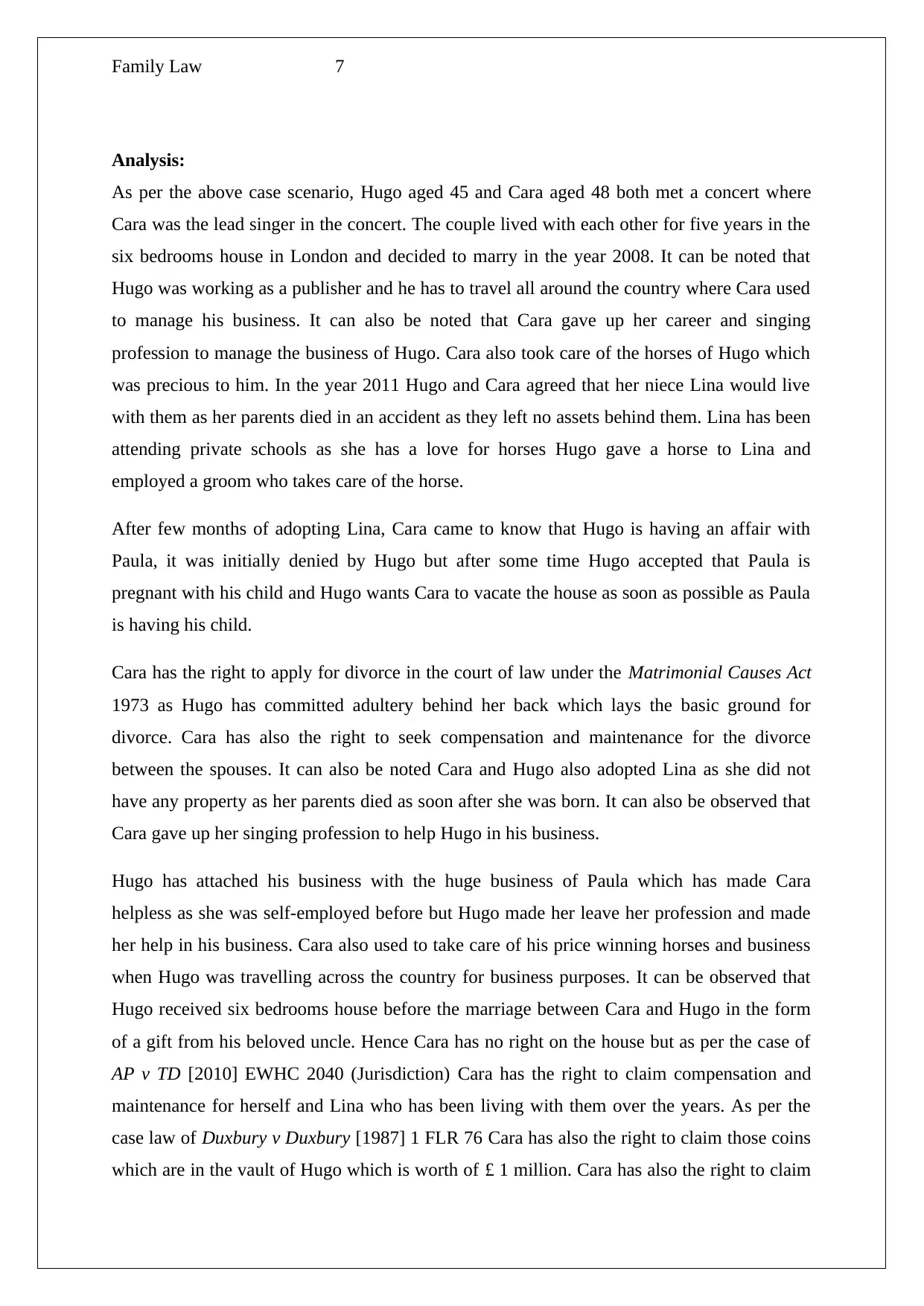
Family Law 7
Analysis:
As per the above case scenario, Hugo aged 45 and Cara aged 48 both met a concert where
Cara was the lead singer in the concert. The couple lived with each other for five years in the
six bedrooms house in London and decided to marry in the year 2008. It can be noted that
Hugo was working as a publisher and he has to travel all around the country where Cara used
to manage his business. It can also be noted that Cara gave up her career and singing
profession to manage the business of Hugo. Cara also took care of the horses of Hugo which
was precious to him. In the year 2011 Hugo and Cara agreed that her niece Lina would live
with them as her parents died in an accident as they left no assets behind them. Lina has been
attending private schools as she has a love for horses Hugo gave a horse to Lina and
employed a groom who takes care of the horse.
After few months of adopting Lina, Cara came to know that Hugo is having an affair with
Paula, it was initially denied by Hugo but after some time Hugo accepted that Paula is
pregnant with his child and Hugo wants Cara to vacate the house as soon as possible as Paula
is having his child.
Cara has the right to apply for divorce in the court of law under the Matrimonial Causes Act
1973 as Hugo has committed adultery behind her back which lays the basic ground for
divorce. Cara has also the right to seek compensation and maintenance for the divorce
between the spouses. It can also be noted Cara and Hugo also adopted Lina as she did not
have any property as her parents died as soon after she was born. It can also be observed that
Cara gave up her singing profession to help Hugo in his business.
Hugo has attached his business with the huge business of Paula which has made Cara
helpless as she was self-employed before but Hugo made her leave her profession and made
her help in his business. Cara also used to take care of his price winning horses and business
when Hugo was travelling across the country for business purposes. It can be observed that
Hugo received six bedrooms house before the marriage between Cara and Hugo in the form
of a gift from his beloved uncle. Hence Cara has no right on the house but as per the case of
AP v TD [2010] EWHC 2040 (Jurisdiction) Cara has the right to claim compensation and
maintenance for herself and Lina who has been living with them over the years. As per the
case law of Duxbury v Duxbury [1987] 1 FLR 76 Cara has also the right to claim those coins
which are in the vault of Hugo which is worth of £ 1 million. Cara has also the right to claim
Analysis:
As per the above case scenario, Hugo aged 45 and Cara aged 48 both met a concert where
Cara was the lead singer in the concert. The couple lived with each other for five years in the
six bedrooms house in London and decided to marry in the year 2008. It can be noted that
Hugo was working as a publisher and he has to travel all around the country where Cara used
to manage his business. It can also be noted that Cara gave up her career and singing
profession to manage the business of Hugo. Cara also took care of the horses of Hugo which
was precious to him. In the year 2011 Hugo and Cara agreed that her niece Lina would live
with them as her parents died in an accident as they left no assets behind them. Lina has been
attending private schools as she has a love for horses Hugo gave a horse to Lina and
employed a groom who takes care of the horse.
After few months of adopting Lina, Cara came to know that Hugo is having an affair with
Paula, it was initially denied by Hugo but after some time Hugo accepted that Paula is
pregnant with his child and Hugo wants Cara to vacate the house as soon as possible as Paula
is having his child.
Cara has the right to apply for divorce in the court of law under the Matrimonial Causes Act
1973 as Hugo has committed adultery behind her back which lays the basic ground for
divorce. Cara has also the right to seek compensation and maintenance for the divorce
between the spouses. It can also be noted Cara and Hugo also adopted Lina as she did not
have any property as her parents died as soon after she was born. It can also be observed that
Cara gave up her singing profession to help Hugo in his business.
Hugo has attached his business with the huge business of Paula which has made Cara
helpless as she was self-employed before but Hugo made her leave her profession and made
her help in his business. Cara also used to take care of his price winning horses and business
when Hugo was travelling across the country for business purposes. It can be observed that
Hugo received six bedrooms house before the marriage between Cara and Hugo in the form
of a gift from his beloved uncle. Hence Cara has no right on the house but as per the case of
AP v TD [2010] EWHC 2040 (Jurisdiction) Cara has the right to claim compensation and
maintenance for herself and Lina who has been living with them over the years. As per the
case law of Duxbury v Duxbury [1987] 1 FLR 76 Cara has also the right to claim those coins
which are in the vault of Hugo which is worth of £ 1 million. Cara has also the right to claim
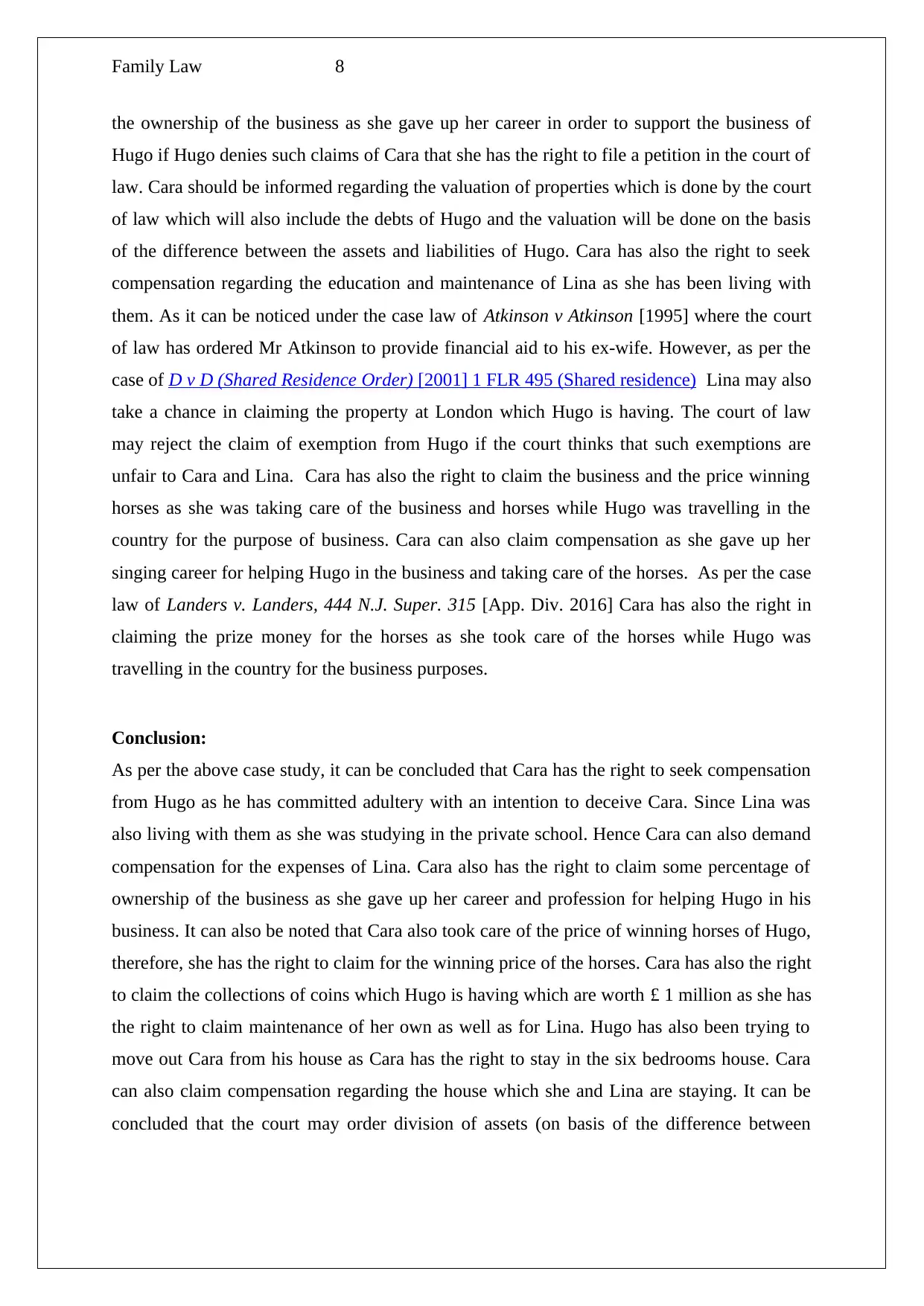
Family Law 8
the ownership of the business as she gave up her career in order to support the business of
Hugo if Hugo denies such claims of Cara that she has the right to file a petition in the court of
law. Cara should be informed regarding the valuation of properties which is done by the court
of law which will also include the debts of Hugo and the valuation will be done on the basis
of the difference between the assets and liabilities of Hugo. Cara has also the right to seek
compensation regarding the education and maintenance of Lina as she has been living with
them. As it can be noticed under the case law of Atkinson v Atkinson [1995] where the court
of law has ordered Mr Atkinson to provide financial aid to his ex-wife. However, as per the
case of D v D (Shared Residence Order) [2001] 1 FLR 495 (Shared residence) Lina may also
take a chance in claiming the property at London which Hugo is having. The court of law
may reject the claim of exemption from Hugo if the court thinks that such exemptions are
unfair to Cara and Lina. Cara has also the right to claim the business and the price winning
horses as she was taking care of the business and horses while Hugo was travelling in the
country for the purpose of business. Cara can also claim compensation as she gave up her
singing career for helping Hugo in the business and taking care of the horses. As per the case
law of Landers v. Landers, 444 N.J. Super. 315 [App. Div. 2016] Cara has also the right in
claiming the prize money for the horses as she took care of the horses while Hugo was
travelling in the country for the business purposes.
Conclusion:
As per the above case study, it can be concluded that Cara has the right to seek compensation
from Hugo as he has committed adultery with an intention to deceive Cara. Since Lina was
also living with them as she was studying in the private school. Hence Cara can also demand
compensation for the expenses of Lina. Cara also has the right to claim some percentage of
ownership of the business as she gave up her career and profession for helping Hugo in his
business. It can also be noted that Cara also took care of the price of winning horses of Hugo,
therefore, she has the right to claim for the winning price of the horses. Cara has also the right
to claim the collections of coins which Hugo is having which are worth £ 1 million as she has
the right to claim maintenance of her own as well as for Lina. Hugo has also been trying to
move out Cara from his house as Cara has the right to stay in the six bedrooms house. Cara
can also claim compensation regarding the house which she and Lina are staying. It can be
concluded that the court may order division of assets (on basis of the difference between
the ownership of the business as she gave up her career in order to support the business of
Hugo if Hugo denies such claims of Cara that she has the right to file a petition in the court of
law. Cara should be informed regarding the valuation of properties which is done by the court
of law which will also include the debts of Hugo and the valuation will be done on the basis
of the difference between the assets and liabilities of Hugo. Cara has also the right to seek
compensation regarding the education and maintenance of Lina as she has been living with
them. As it can be noticed under the case law of Atkinson v Atkinson [1995] where the court
of law has ordered Mr Atkinson to provide financial aid to his ex-wife. However, as per the
case of D v D (Shared Residence Order) [2001] 1 FLR 495 (Shared residence) Lina may also
take a chance in claiming the property at London which Hugo is having. The court of law
may reject the claim of exemption from Hugo if the court thinks that such exemptions are
unfair to Cara and Lina. Cara has also the right to claim the business and the price winning
horses as she was taking care of the business and horses while Hugo was travelling in the
country for the purpose of business. Cara can also claim compensation as she gave up her
singing career for helping Hugo in the business and taking care of the horses. As per the case
law of Landers v. Landers, 444 N.J. Super. 315 [App. Div. 2016] Cara has also the right in
claiming the prize money for the horses as she took care of the horses while Hugo was
travelling in the country for the business purposes.
Conclusion:
As per the above case study, it can be concluded that Cara has the right to seek compensation
from Hugo as he has committed adultery with an intention to deceive Cara. Since Lina was
also living with them as she was studying in the private school. Hence Cara can also demand
compensation for the expenses of Lina. Cara also has the right to claim some percentage of
ownership of the business as she gave up her career and profession for helping Hugo in his
business. It can also be noted that Cara also took care of the price of winning horses of Hugo,
therefore, she has the right to claim for the winning price of the horses. Cara has also the right
to claim the collections of coins which Hugo is having which are worth £ 1 million as she has
the right to claim maintenance of her own as well as for Lina. Hugo has also been trying to
move out Cara from his house as Cara has the right to stay in the six bedrooms house. Cara
can also claim compensation regarding the house which she and Lina are staying. It can be
concluded that the court may order division of assets (on basis of the difference between
⊘ This is a preview!⊘
Do you want full access?
Subscribe today to unlock all pages.

Trusted by 1+ million students worldwide
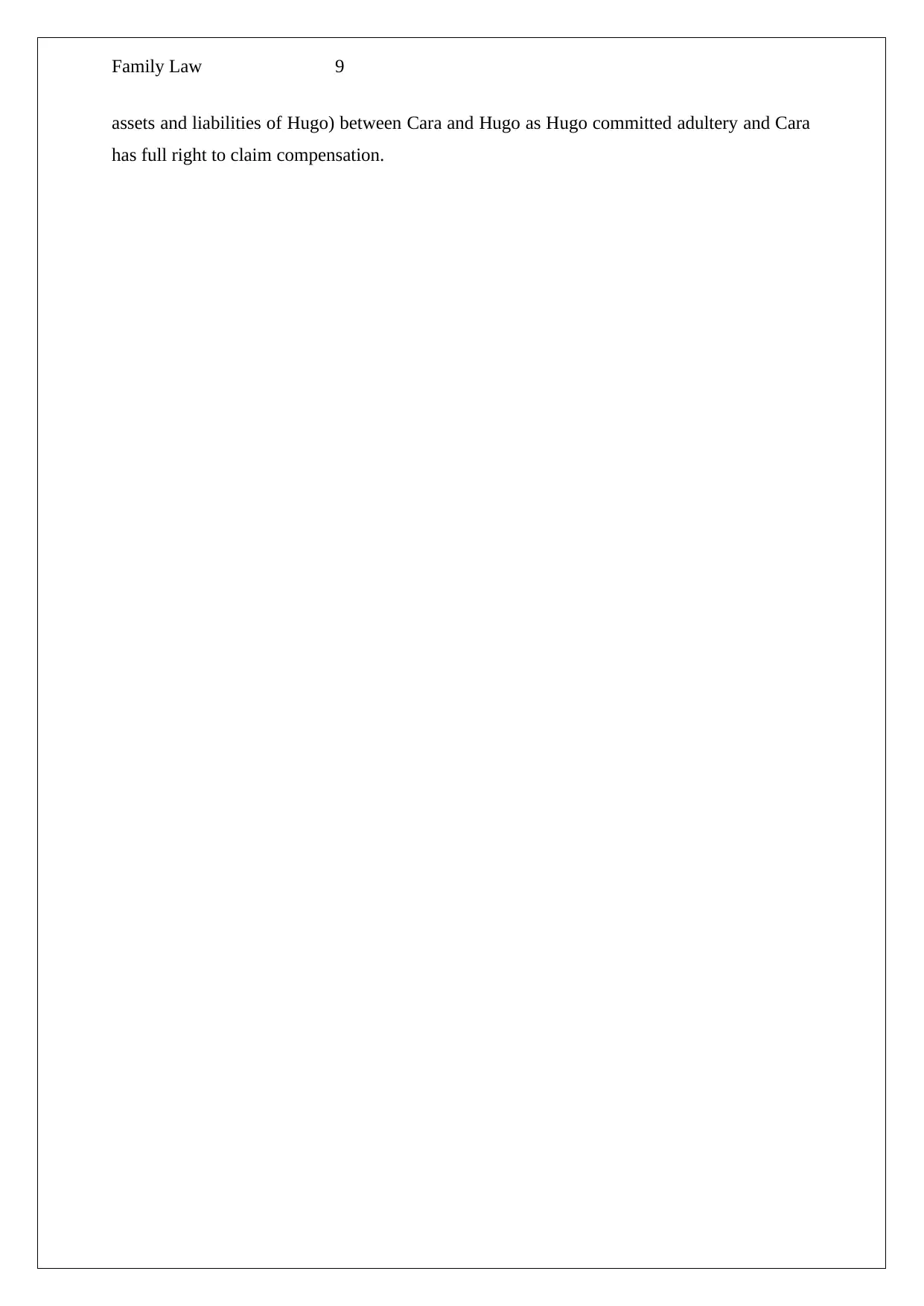
Family Law 9
assets and liabilities of Hugo) between Cara and Hugo as Hugo committed adultery and Cara
has full right to claim compensation.
assets and liabilities of Hugo) between Cara and Hugo as Hugo committed adultery and Cara
has full right to claim compensation.
Paraphrase This Document
Need a fresh take? Get an instant paraphrase of this document with our AI Paraphraser
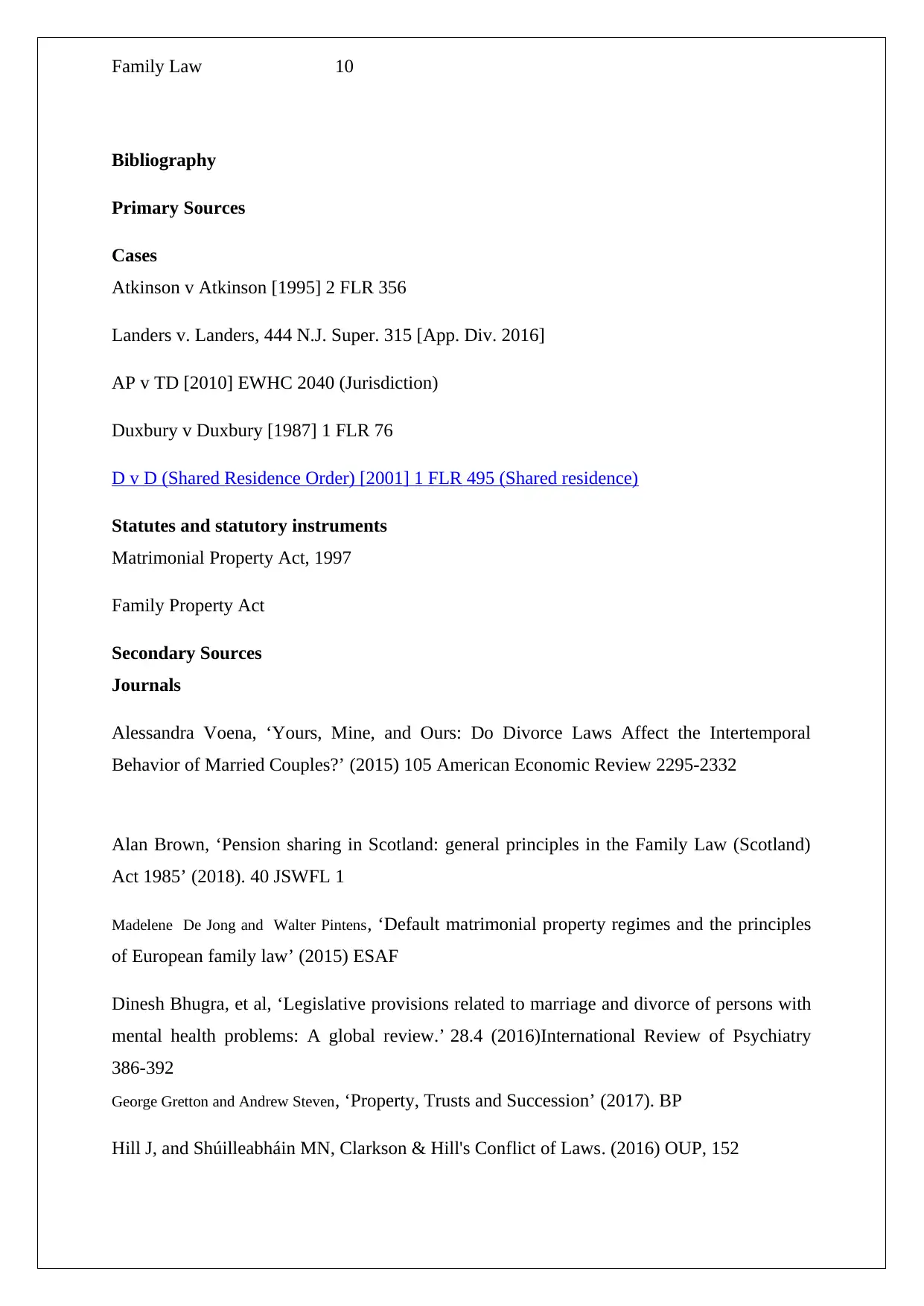
Family Law 10
Bibliography
Primary Sources
Cases
Atkinson v Atkinson [1995] 2 FLR 356
Landers v. Landers, 444 N.J. Super. 315 [App. Div. 2016]
AP v TD [2010] EWHC 2040 (Jurisdiction)
Duxbury v Duxbury [1987] 1 FLR 76
D v D (Shared Residence Order) [2001] 1 FLR 495 (Shared residence)
Statutes and statutory instruments
Matrimonial Property Act, 1997
Family Property Act
Secondary Sources
Journals
Alessandra Voena, ‘Yours, Mine, and Ours: Do Divorce Laws Affect the Intertemporal
Behavior of Married Couples?’ (2015) 105 American Economic Review 2295-2332
Alan Brown, ‘Pension sharing in Scotland: general principles in the Family Law (Scotland)
Act 1985’ (2018). 40 JSWFL 1
Madelene De Jong and Walter Pintens, ‘Default matrimonial property regimes and the principles
of European family law’ (2015) ESAF
Dinesh Bhugra, et al, ‘Legislative provisions related to marriage and divorce of persons with
mental health problems: A global review.’ 28.4 (2016)International Review of Psychiatry
386-392
George Gretton and Andrew Steven, ‘Property, Trusts and Succession’ (2017). BP
Hill J, and Shúilleabháin MN, Clarkson & Hill's Conflict of Laws. (2016) OUP, 152
Bibliography
Primary Sources
Cases
Atkinson v Atkinson [1995] 2 FLR 356
Landers v. Landers, 444 N.J. Super. 315 [App. Div. 2016]
AP v TD [2010] EWHC 2040 (Jurisdiction)
Duxbury v Duxbury [1987] 1 FLR 76
D v D (Shared Residence Order) [2001] 1 FLR 495 (Shared residence)
Statutes and statutory instruments
Matrimonial Property Act, 1997
Family Property Act
Secondary Sources
Journals
Alessandra Voena, ‘Yours, Mine, and Ours: Do Divorce Laws Affect the Intertemporal
Behavior of Married Couples?’ (2015) 105 American Economic Review 2295-2332
Alan Brown, ‘Pension sharing in Scotland: general principles in the Family Law (Scotland)
Act 1985’ (2018). 40 JSWFL 1
Madelene De Jong and Walter Pintens, ‘Default matrimonial property regimes and the principles
of European family law’ (2015) ESAF
Dinesh Bhugra, et al, ‘Legislative provisions related to marriage and divorce of persons with
mental health problems: A global review.’ 28.4 (2016)International Review of Psychiatry
386-392
George Gretton and Andrew Steven, ‘Property, Trusts and Succession’ (2017). BP
Hill J, and Shúilleabháin MN, Clarkson & Hill's Conflict of Laws. (2016) OUP, 152
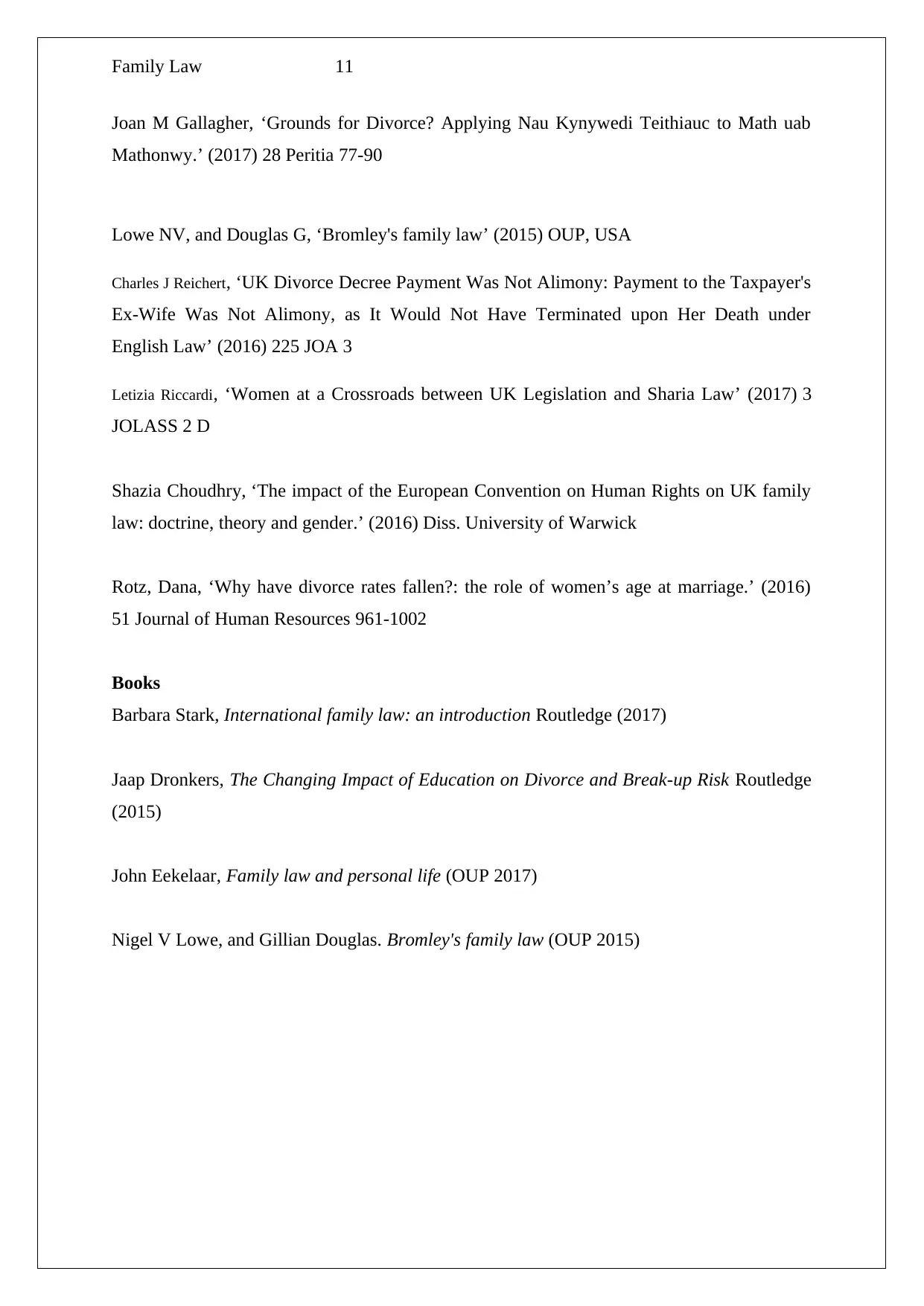
Family Law 11
Joan M Gallagher, ‘Grounds for Divorce? Applying Nau Kynywedi Teithiauc to Math uab
Mathonwy.’ (2017) 28 Peritia 77-90
Lowe NV, and Douglas G, ‘Bromley's family law’ (2015) OUP, USA
Charles J Reichert, ‘UK Divorce Decree Payment Was Not Alimony: Payment to the Taxpayer's
Ex-Wife Was Not Alimony, as It Would Not Have Terminated upon Her Death under
English Law’ (2016) 225 JOA 3
Letizia Riccardi, ‘Women at a Crossroads between UK Legislation and Sharia Law’ (2017) 3
JOLASS 2 D
Shazia Choudhry, ‘The impact of the European Convention on Human Rights on UK family
law: doctrine, theory and gender.’ (2016) Diss. University of Warwick
Rotz, Dana, ‘Why have divorce rates fallen?: the role of women’s age at marriage.’ (2016)
51 Journal of Human Resources 961-1002
Books
Barbara Stark, International family law: an introduction Routledge (2017)
Jaap Dronkers, The Changing Impact of Education on Divorce and Break-up Risk Routledge
(2015)
John Eekelaar, Family law and personal life (OUP 2017)
Nigel V Lowe, and Gillian Douglas. Bromley's family law (OUP 2015)
Joan M Gallagher, ‘Grounds for Divorce? Applying Nau Kynywedi Teithiauc to Math uab
Mathonwy.’ (2017) 28 Peritia 77-90
Lowe NV, and Douglas G, ‘Bromley's family law’ (2015) OUP, USA
Charles J Reichert, ‘UK Divorce Decree Payment Was Not Alimony: Payment to the Taxpayer's
Ex-Wife Was Not Alimony, as It Would Not Have Terminated upon Her Death under
English Law’ (2016) 225 JOA 3
Letizia Riccardi, ‘Women at a Crossroads between UK Legislation and Sharia Law’ (2017) 3
JOLASS 2 D
Shazia Choudhry, ‘The impact of the European Convention on Human Rights on UK family
law: doctrine, theory and gender.’ (2016) Diss. University of Warwick
Rotz, Dana, ‘Why have divorce rates fallen?: the role of women’s age at marriage.’ (2016)
51 Journal of Human Resources 961-1002
Books
Barbara Stark, International family law: an introduction Routledge (2017)
Jaap Dronkers, The Changing Impact of Education on Divorce and Break-up Risk Routledge
(2015)
John Eekelaar, Family law and personal life (OUP 2017)
Nigel V Lowe, and Gillian Douglas. Bromley's family law (OUP 2015)
⊘ This is a preview!⊘
Do you want full access?
Subscribe today to unlock all pages.

Trusted by 1+ million students worldwide
1 out of 12
Related Documents
Your All-in-One AI-Powered Toolkit for Academic Success.
+13062052269
info@desklib.com
Available 24*7 on WhatsApp / Email
![[object Object]](/_next/static/media/star-bottom.7253800d.svg)
Unlock your academic potential
Copyright © 2020–2026 A2Z Services. All Rights Reserved. Developed and managed by ZUCOL.





